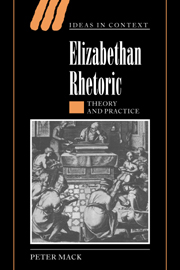Book contents
- Frontmatter
- Contents
- Acknowledgements
- Introduction
- 1 Rhetoric in the grammar school
- 2 Rhetoric and dialectic at Oxford and Cambridge
- 3 English-language manuals of rhetoric and dialectic
- 4 Everyday writing: notebooks, letters, narratives
- 5 Histories, conduct manuals, romances
- 6 Political argument
- 7 Elizabethan parliamentary oratory
- 8 Religious discourse
- Conclusion
- Bibliography
- Index of rhetorical and dialectical terms
- General index
- IDEAS IN CONTEXT
3 - English-language manuals of rhetoric and dialectic
Published online by Cambridge University Press: 22 September 2009
- Frontmatter
- Contents
- Acknowledgements
- Introduction
- 1 Rhetoric in the grammar school
- 2 Rhetoric and dialectic at Oxford and Cambridge
- 3 English-language manuals of rhetoric and dialectic
- 4 Everyday writing: notebooks, letters, narratives
- 5 Histories, conduct manuals, romances
- 6 Political argument
- 7 Elizabethan parliamentary oratory
- 8 Religious discourse
- Conclusion
- Bibliography
- Index of rhetorical and dialectical terms
- General index
- IDEAS IN CONTEXT
Summary
ENGLISH MANUALS AND THE LATIN EDUCATIONAL CONTEXT
Given that the English manuals have received far more attention in the scholarly literature than the Latin textbooks used in school and university, it needs to be stated at the outset that only four of the twenty were printed more than twice in the sixteenth century. Thomas Wilson's Rule of Reason was printed seven times between 1551 and 1580, his Art of Rhetoric eight times between 1553 and 1585, William Fulwood's Enemie of Idleness ten times between 1568 and 1621 and Angel Day's The English Secretary nine times between 1586 and 1635. By contrast, George Puttenham's Arte of English Poesie, upon which so many theories of Elizabethan culture have been erected, was printed only once in 1589, and the elder Henry Peacham's Garden of Eloquence once in each of its editions (1577 and 1593).
Any educationally based account of the English manuals must therefore concentrate mainly on Wilson, Fulwood and Day. These are the only English-language manuals which can have exercised much influence in transmitting doctrine. Other manuals may help us understand the way in which rhetorical teachings were received and adapted.
I shall argue that there is one important exception to this rule. Sherry, Peacham, Puttenham (in his third book), Wilson (in the third book of his Rhetoric) and Day (in his last eight editions) all produced versions of an English style manual. The material which these treatments share (the bulk of the manual) therefore went through twenty-one editions.
- Type
- Chapter
- Information
- Elizabethan RhetoricTheory and Practice, pp. 76 - 102Publisher: Cambridge University PressPrint publication year: 2002



